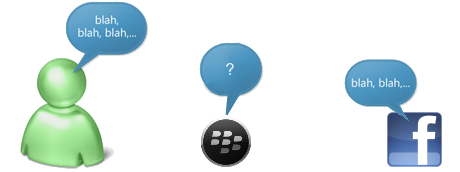Has instant messaging gone out of fashion?

A BBC report today states that numbers of instant messaging users has dropped significantly in the last three years. While I can understand some of the plain, simple facts behind the article - and don't necessarily disagree, I believe the notion of 'instant messaging' has changed entirely.

First there were chat rooms, where everybody could jump into this online world and discuss topics. And with that, chat became instant messaging where you could select your contacts and talk back and forth privately with those instantly.
And such programs as Windows Live Messenger and ICQ are slowly being shifted away from. But I don't think 'instant messaging' is in decline; rather the Generation Y defines nowadays as 'chat'.
Almost every application designed for communicating - including "dedicated" applications such as Skype used for Internet calling - includes instant messaging. The top rocker being Windows Live Messenger of course includes the usual jazz chat format - so popular that it was rolled out to its web email counterpart - but with additional video calling and personalisation.
The problem is finding a network of which everyone you know can connect with. Many of the instant messaging networks opened their protocols to allow inter-application communication - the most 'famous' of which being Yahoo! and Windows Live. But this doesn't compete with 'universal' email communication, or nowadays, Facebook; that is when it doesn't go horribly wrong.
To use this as an example, I actively use Skype, Facebook - which includes the chat feature, in my argument replacing that of ordinary standalone instant messenger applications - and Windows Live Messenger. But even I have noticed the shift from a desktop application to a social networking chat feature.
Over the course of the last few months, my active access to Facebook has increased whereas Windows Live Messenger has been running, but in the background and not used by nearly a fraction of the online social network.
So instant messaging in my - and my generation's point of view - hasn't gone out fashion, it has merely changed its meaning and definition. Chat is still very much active on the web and a huge part of communicating.
Even with increased non-enterprise access to BlackBerry devices with their in-built Messenger application has spurred on 'chatting'. Not only this but it allows users to bypass state controlled sanctions which snoop on citizens' communications and allows full freedom of expression without interception.
But even though the terms 'instant messaging' and 'chat' are practically synonymous, it does allow for a shift in web-to-web communication, instead of desktop-to-desktop communications.
Though some of your friends will be from home and elsewhere, if most of your friends are at your university and connect with in-built chat features within their outsourced Google Apps for Education or Microsoft Live@edu email environment, could this pull away from increasing Facebook chat figures?
I think it might, you know.